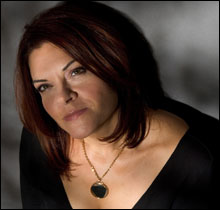 Black Cadillac (Capitol) is a lovely album. It’s also a bit dull and uneven. When Rosanne Cash is at her best in its dozen songs, they resonate with graceful, poetic language and honest emotions in a way that feels like another creative breakthrough for Johnny Cash’s first child, who has already enjoyed a long, successful career as a respected singer-songwriter.
Black Cadillac (Capitol) is a lovely album. It’s also a bit dull and uneven. When Rosanne Cash is at her best in its dozen songs, they resonate with graceful, poetic language and honest emotions in a way that feels like another creative breakthrough for Johnny Cash’s first child, who has already enjoyed a long, successful career as a respected singer-songwriter.
But some of the songs have been wedged into arrangements that don’t fit. And the dominant slow-to-mid-tempo pace forces Cash into a corner where her performances are simply too similar. She has a limited vocal range to begin with — no sin for an adept songwriter. She compensates by singing in full, round tones and doubling her vocal parts, a standard move in pop studio production. Cash had polyps in 1998 that temporarily caused her to lose her voice, though it’s debatable whether that’s had any effect on her current abilities.

Black Cadillac is framed as a diary of Cash’s feelings and observations about the lives of her father, her stepmother, June Carter Cash, and her mother, Vivian Liberto Cash Distin, all of whom died within two years. The opening title song contemplates death as the unavoidable destination of all our travels. “Burn Down This Town” celebrates her dad’s rebel spirit. “House on the Lake” and “The World Unseen,” which run together, work as a mini-suite about how we see the shadows of the dead in the places we shared with them in life.
This captivating pair blend acoustic and electric instruments and Cash’s hushed singing to layer the joy and sadness of memories with a resolution to carry on and to celebrate the lives now ended. But such quietude becomes a sonic theme that, beginning with the piano ballad “I Was Watching You,” is too often too lulling. By the time the disc closes — with the poky folk song “The Good Intent,” a metaphorical story set to piano and acoustic guitar with some nice turns of phrase that describe the struggle it took to tame the Delta into farmland — it’s hard to stay focused on what Cash is trying to say about the transcendent power of the human spirit.
The trouble actually begins with “Black Cadillac.” Producer Bill Bottrell undermines the song with a bass line that’s too busy and so high in the mix it distracts from Cash’s singing. It sounds like a clumsy effort to move a gentle song into pop-radio territory.
There’s a reason for that. With Johnny Cash’s 2003 death still fresh in the minds of his fans thanks to continual reissues and the movie Walk the Line, Capitol is giving this album the kind of push it usually reserves for a new Radiohead or Robbie Williams disc. For the label, Cash equals cash, and since Sony has Johnny’s catalogue and June’s, Black Cadillac is the next best thing. I got the pervasive feeling that Capitol has attempted to turn a small, soulful album with some flaws into a Big Record with gold — if not platinum — potential.
What’s disappointing is how readily the mainstream music press has walked the record company’s line, with fawning, release-date-coordinated features in everything from Newsweek to Entertainment Weekly to major newspapers contributing to Capitol’s campaign to market Black Cadillac as a heartbreaking work of staggering genius. That doesn’t mean the album doesn’t have its charms and its value. But, please, don’t believe the hype.
___
On the Web:
Rosanne Cash: //www.rosannecash.com/
Johnny Cash: //www.johnnycash.com/